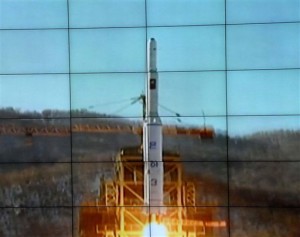
In this monitor screen image taken by the Korean Central News Agency and distributed in Tokyo by the Korea News Service, the Unha-3 rocket lifts off from a launch site on the west coast, in the village of Tongchang-ri, North Korea, Wednesday, Dec. 12, 2012. Officials from the Philippines and the US on Wednesday strongly condemned North Korea’s decision to pursue its rocket launch. AP PHOTO/KOREA CENTRAL NEWS AGENCY VIA KOREA NEWS SERVICE
MANILA, Philippines—Officials from the Philippines and the United States on Wednesday strongly condemned North Korea’s decision to pursue its rocket launch, saying that the two countries would strengthen and increase their alliances with the “current threat to regional security.”
The joint statement issued by both sides at the conclusion of their third Bilateral Strategic Dialogue emphasized that both countries viewed the act as “highly provocative” and in direct violation of relevant United Nations Security Council resolutions.
Philippine diplomats, defense officials, and their US counterparts convened for the two-day dialogue, which tackled issues on the economy, rule of law, diplomatic engagement and defense.
The talks, held in Manila from December 11 to 12, were co-chaired by Foreign Undersecretary and now new Philippine Ambassador to China Erlinda Basilio and Defense Undersecretary Pio Lorenzo Batino for the Philippine side and for the American side by US State Department Assistant Secretary Kurt Campbell and Defense Assistant Secretary Mark Lippert.
Campbell, for his part, thanked the Philippines for standing with the international community in condemning the act, saying that the US would work very closely with its allies to do an assessment of the issue.
“We would be taking steps tomorrow at the UN…..working closely with our partners in the security council,” Campbell told reporters on Wednesday.
Increased cooperation
Batino, for his part, noted that there were substantial discussions on the increased rotational presence of American troops in the country, and noted that it would “primarily be an increase of the defense cooperation activities such as trainings and exercises all geared for maritime security and disaster relief.”
When pressed by reporters about details, Batino repeatedly said that there were discussions on a possible framework but that the specifics would be determined by technical working groups.
“It’s going to be a very significant development in our relations so there is a need to discuss this further,” Batino said. He added that both parties agreed that everything that would be implemented “should be in accordance with Philippine and US laws.”
He said that the increased defense cooperation between the two countries would surely benefit the Philippines especially in disaster relief, citing the recent move by the US to deploy C 130 planes to aid in the distribution of relief goods for the victims of typhoon Pablo, the worst storm to hit the country this year.
The officials noted that discussions on the West Philippine Sea (South China Sea) dispute were “extensive” but did not elaborate.
Basilio noted that that the discussions on the rule of law highlighted the Philippines’ advocacy for a peaceful settlement of conflicting territorial claims in the West Philippine Sea
“We just want peace and stability there and it is my task also that we ensure excellent relations with them,” Basilio said.
Campbell also noted that relations between the countries are on a substantial upswing, saying that both sides were active and deepening and strengthening the ties on every level—strategically, politically, economically and militarily.
“We believe that we are at a renaissance and building a strong relationship for the future….We want a different kind of relationship based on mutual respect and equality,” he said.